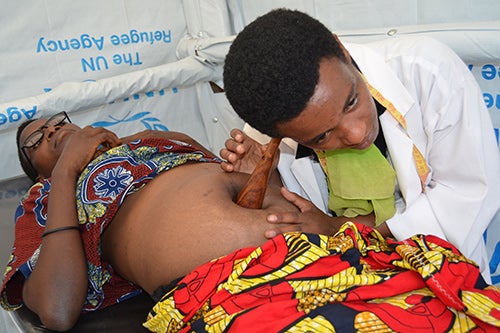News
Safe birth for Burundi refugees in Rwanda
- 11 June 2015
News
MAHAMA CAMP, Rwanda – After violence broke out near her home in Burundi, Chantal Uwamahoro walked for days to reach safety at a Rwandan refugee camp. “I walked with difficulty because I was heavily pregnant, with my first born son on my back,” she said. “It took our group four days to reach the Gashora Reception Centre.”
The prospect of delivering her baby in unknown conditions, under desperate circumstances, terrified her. “I had expected the worst to happen,” said Ms. Uwamahoro, 25.
But instead, she found a fully operational maternity ward in Mahama Refugee Camp, where she was staying. “I delivered my baby normally,” she said, cuddling her day-old baby girl.
The crisis in Burundi has forced nearly 100,000 people to flee into neighbouring countries, according the latest data from the UN Refugee Agency. By 9 June, some 30,000 refugees had arrived in Rwanda, including 25,000 in Mahama Camp alone.

At least three women give birth at the camp’s maternity ward each day, said Philomene Nyirahabiyaremye, the midwife in charge. She and the other health staff work hard to ensure every woman receives the best care possible.
“I did not expect to give birth normally because I experienced complications during the long journey to the camp,” said Eveline Kamurera, 24, who walked for two days to reach Rwanda. Her baby boy was safely born on 21 May.
Ms. Nyirahabiyaremye says women arrive at the camp with little. “Mothers come here with no baby kits. Fortunately we have dignity kits donated by UNFPA, which we give them,” she said, referring to kits containing essential hygiene supplies.
The maternity ward provides a full suite of services for pregnant women and new mothers, including antenatal care and post-natal care. Marie Vestine Nyirantagorama, the nurse in charge of antenatal care, says her unit cares for 60 women every day, a number that is expected to increase as more refugees arrive in the camp.
“As the number increases, we expect to get more nurses,” she said.
At the camp’s health centre, some 80 community health workers speak with pregnant refugees about proper nutrition and the availability of antenatal and post-natal care. They also urge women to deliver in the maternity ward, said Dennis Sezibera, a health education coordinator.
UNFPA is working with the American Refugee Committee (ARC) to provide training and support to the community health workers, Mr. Sezibera said.
UNFPA is also providing reproductive health commodities and services, including emergency reproductive health kits, to both ARC and Kirehe District Hospital. Health workers in the Kirehe hospital and Mahama Camp have been trained to use the emergency kits, which support life-saving care for women experiencing pregnancy complications.
A monitoring system has also been established to ensure data on these services is available and quality conforms to international standards.
In its assessment at Mahama Camp last week, UNFPA and ARC identified 454 pregnant women, 225 of whom had received antenatal care. Fifty-six women had delivered under the care of skilled birth attendants. More than 6,500 condoms have been distributed in the last three weeks.
–David Ssekyanzi